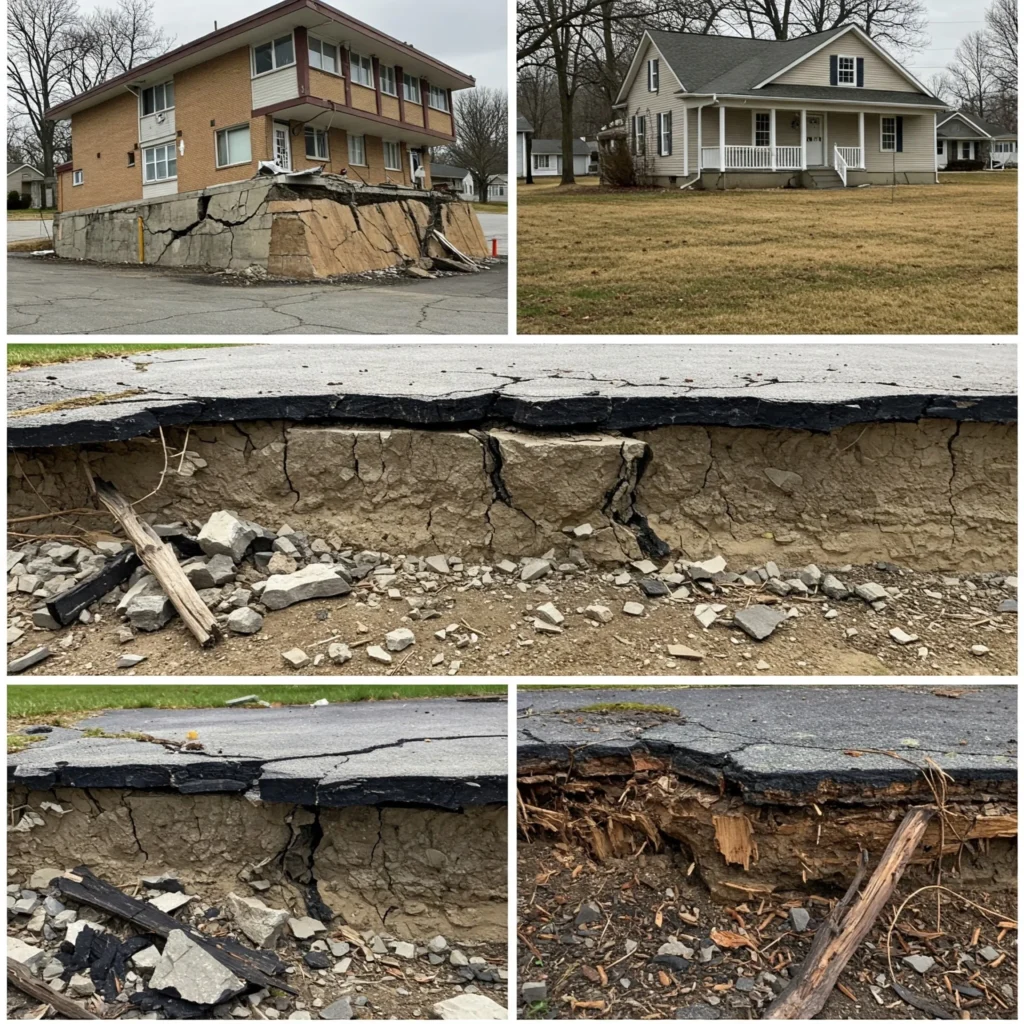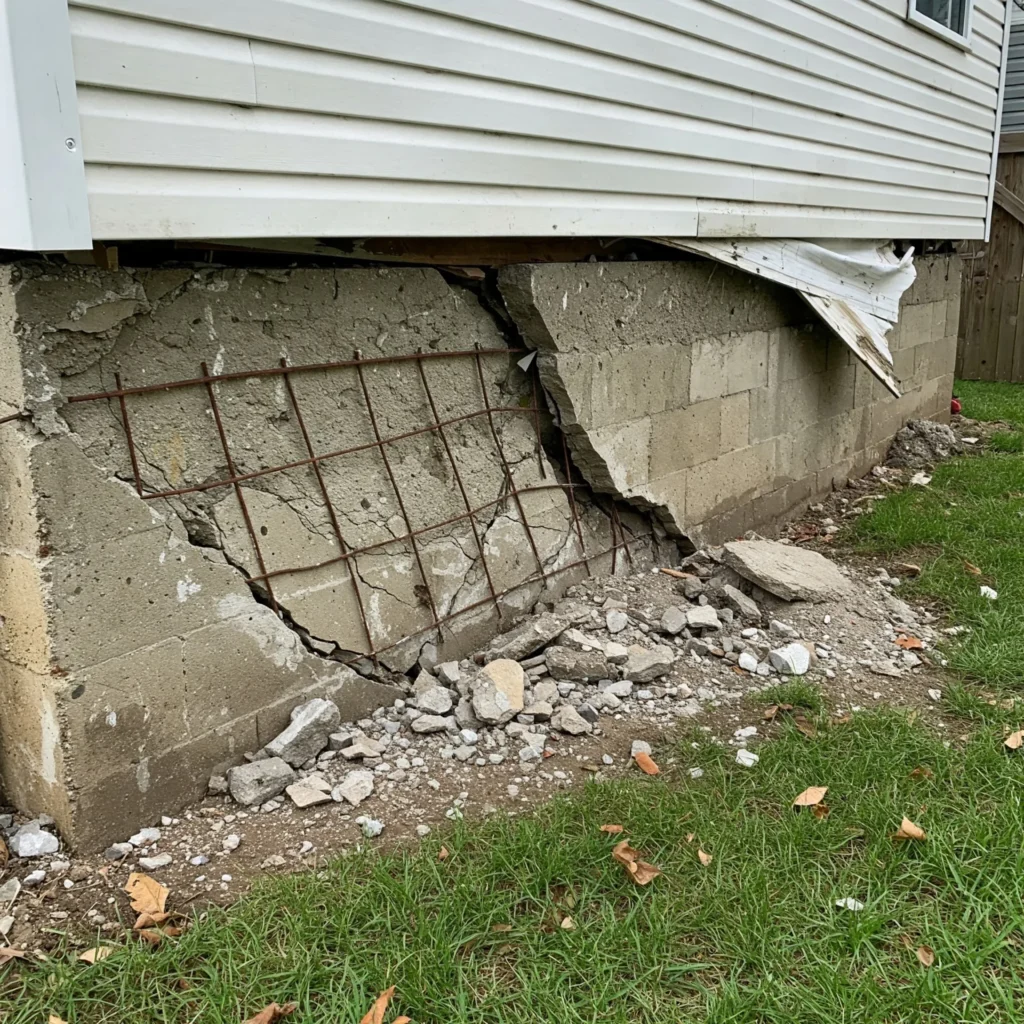Wondering if your home’s foundation problems are beyond repair? You’re not alone. Foundation damage is a major concern for homeowners and the fear of it being unfixable can be overwhelming.
You might like: Foundation Crack Repair: The Ultimate Step-by-Step Guide
Here’s the good news: most foundation problems can be fixed.
But in some rare cases, the damage may be too far gone.
Let’s walk through what makes a foundation issue unfixable, how to spot the warning signs, and what to do next.
✅ Can All Foundation Problems Be Fixed?
In most cases, yes.
The majority of foundation issues can be repaired using proven solutions like piers, slab leveling, or drainage correction. The key is catching the problem early before it worsens.
Common fixable foundation issues include:
Cracks in walls or floors
Uneven or sagging floors
Doors or windows that stick
Gaps between walls and ceilings
These signs might seem scary but they often point to problems that can be corrected with professional help.

🚫 What Makes a Foundation Problem “Unfixable”?
While most foundation problems are treatable, there are some rare situations where repair just isn’t practical or safe.
Here are 5 signs a foundation problem might be unfixable:
1. Total Structural Collapse
If a foundation has completely collapsed or broken into several unstable sections, it’s often beyond repair. This kind of extreme damage compromises the entire structure, making it unsafe to rebuild or reinforce. Repairs won’t restore the original strength or safety, and in many cases, the cost of attempting a fix is higher than rebuilding from scratch. When a home’s base has crumbled to this extent, full demolition and reconstruction are typically the only safe and lasting solution.
2. Unstable or Shifting Soil Conditions
When the soil under your foundation is constantly moving — due to things like expansive clay, erosion, sinkholes, or landslides — repairs may only offer short-term relief. Even after leveling or stabilizing the foundation, the ongoing soil movement will continue to cause damage. Without addressing the underlying soil issues, any repair is likely to fail again. In some extreme cases, the site itself is not suitable for building, and relocating the structure or rebuilding elsewhere becomes the best option.
3. Severe Water or Termite Damage
Water and termite damage can weaken foundation materials to the point where they’re no longer structurally sound. In pier-and-beam homes, wooden supports may rot or become infested beyond recovery. If moisture has penetrated deeply into concrete or masonry foundations, mold, corrosion, and crumbling can occur. When the material is too far gone, reinforcement may not work — and rebuilding sections or replacing the entire foundation might be necessary. In these cases, repairing becomes riskier and less cost-effective than starting fresh.
4. Long-Term Neglect and Deterioration
If foundation issues are left unaddressed for many years, the damage often spreads throughout the entire home. Cracks widen, walls bow, floors sag, and the framing may warp beyond repair. By the time the problem is finally evaluated, the structure may be too unstable to safely repair without major reconstruction. Extensive deterioration can also affect plumbing, electrical systems, and roofing turning a foundation repair into a full-scale rebuild. The longer the problem goes untreated, the harder (and more expensive) it is to fix.
5. Inaccessible or High-Risk Repair Conditions
Some homes are built in ways that make foundation repair extremely difficult or even dangerous. This might include steep hillsides, tight crawlspaces, or foundations buried too deep to reach without major excavation. In these cases, the physical limitations and safety risks involved can make repairs unfeasible. Even if a repair is technically possible, the labor and equipment needed may drive the cost well beyond the value of the home itself. When that happens, replacement or relocation becomes the only realistic solution.
How Do I Know If My Foundation Can’t Be Fixed?
The only way to know for sure is to have a licensed foundation expert inspect your home. But here are some red flags that could point to major trouble:
Large, widening cracks in the foundation or walls
Buckling or bowing walls
Strong musty odors from moisture damage
Doors and windows that are completely jammed
A noticeable lean or tilt in the structure
If you’re seeing any of these, don’t panic — but don’t wait. The sooner a professional takes a look, the better your options will be.
Can You Sell a House With Foundation Problems?
Yes but there’s a catch.
If the problem is unfixable, your home’s value could drop significantly. Most buyers won’t want the risk or cost of dealing with structural issues. You may need to sell it “as-is” to an investor, or as a tear-down.
Be sure to disclose any known foundation issues. It’s required by law in many states, and hiding it can lead to legal trouble.

What Should I Do If I Suspect Foundation Damage?
Here’s your action plan:
Look for the signs: Cracks, sagging floors, sticking doors.
Call a professional: Don’t rely on guesswork.
Act quickly: Foundation problems never get better on their own.
Need a Foundation Inspection in Texas?
If you’re in Texas and worried about your foundation, R.L. NELSON Foundation Solutions has your back. We’ve been helping homeowners like you for over 30 years — with honest inspections and real solutions.
📞 Call us today at 281-420-1739 or schedule your inspection online.
Don’t wait until the damage is done.
Catch foundation problems early and protect the home you love.
Frequently Asked Questions
1. Can foundation problems be too severe to fix?
Yes, although it’s rare. Foundation problems can be too severe to fix when there’s total structural collapse, extreme soil instability, severe water or termite damage, or when repairs would be unsafe or cost more than rebuilding. A professional inspection is the only way to know for sure.
2. How do I know if my foundation is beyond repair?
Signs your foundation may be beyond repair include large, widening cracks, bowing walls, severely uneven floors, and doors or windows that no longer function at all. If your home feels unsafe or shows extreme structural movement, get a licensed foundation expert to assess the situation immediately.
3. Is it worth fixing a bad foundation?
In most cases, yes fixing a foundation can prevent bigger issues down the road and protect your home’s value. However, if the damage is extensive and the cost of repair exceeds the value of the home, it might not be financially practical. A trusted contractor can help you weigh the options.

